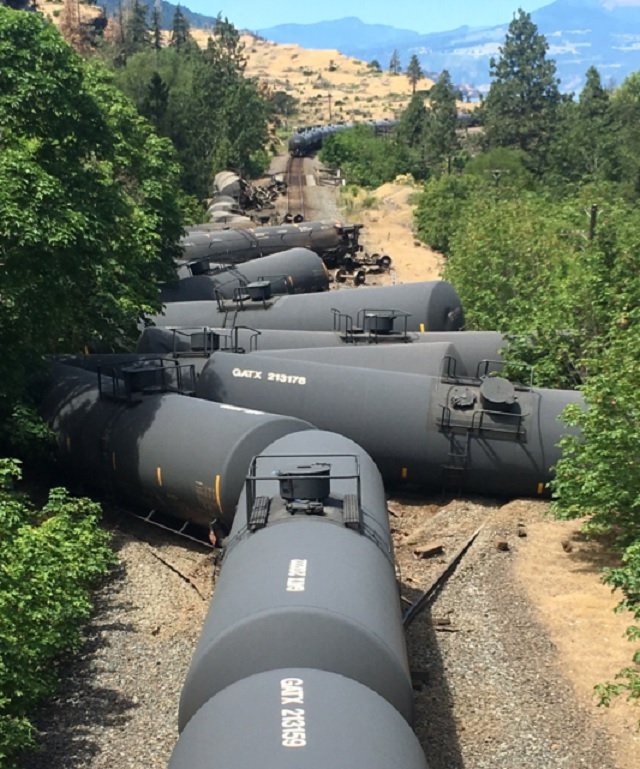A great many people in the progressive movement have been warning that it would only be a matter of time before an insufficiently-secured coal or oil train derailed here in the Pacific Northwest. And now, it’s happened:
A multi-car oil train derailment Friday in the Columbia River Gorge near Mosier sent up a massive plume of black smoke and stoked long-standing fears about the risks of hauling crude oil through one of the Pacific Northwest’s most renowned landmarks.
Eleven cars from a 96-car Union Pacific train derailed west of the small city about 12:20 p.m. At least one car caught on fire and released oil, but no one was injured, said railroad spokesman Aaron Hunt.
The train originated in New Town, North Dakota, and was moving Bakken crude to the U.S. Oil & Refinery Co. refinery in Tacoma, said company spokeswoman Marcia Nielsen.
The accident closed a 27-mile stretch of Interstate 84 for hours as a precaution and caused the evacuation of a community school.
The governors of Oregon and Washington responded quickly to the derailment.
“I am grateful to local first responders, HazMat teams, and other state agencies for doing their best to keep the community of Mosier safe,” said Oregon Governor Kate Brown in a statement sent to NPI. “I am closely monitoring the situation and ready to make every state resource available as needed. I ask that travelers seek alternate routes away from this area until further notice. The Oregon Department of Transportation will provide continuous updates on travel conditions.”
“Today’s derailment of a train carrying Bakken crude oil in the Columbia River Gorge is yet another reminder of the risks and concerns of crude-by-rail transport in our region,” added Washington Governor Jay Inslee. “I join Gov. Brown in commending the swift response from Oregon’s public safety and transportation officials.”
“There are no reports of oil entering the Columbia River, and fortunately no reports of injuries. Along with the Department of Ecology and the Utilities and Transportation Commission, I will continue to monitor the situation and provide support to Gov. Brown in whatever way we can.”
Railroad conglomerates like Burlington Northern Santa Fe (BNSF) and Union Pacific (UP) are backing projects that could result in one million barrels of oil a day moving through the region on one hundred trains per week, according to an updated analysis by our friends at the Sightline Institute.
“Moving large quantities of oil by rail would represent a major change for the Northwest’s energy economy, and the plans now in development put the region’s communities at risk,” the report notes.
State Senator Reuven Carlyle (D‑36th District: Queen Anne, Magnolia, Ballard) said in a statement that it’s time for urgent action to ensure the safety of Pacific Northwest communities from explosive fossil fuel-laden freight trains.
Just two years following the wake up call derailment under the Magnolia Bridge in Seattle — among the most dense neighborhoods in our state — we see massive flames on the edge of the mighty Columbia while responders prepare for oil to spill into the water.
Dozens of federal laws with elegant sounding environmental names seem toothless at the very moment we need to more effectively protect the public against unrestricted oil by rail traffic.
It is time for action and resolve as a state in the midst of federal impotence. We should immediately deny permits to all proposed oil-by-rail facilities in Washington (Vancouver, Hoquiam, Anacortes).
We should demand that existing oil-by-rail industry carry insurance proportional to the risk they are delivering to our communities.
The federal government should issue a well crafted moratorium on the movements of all oil trains until they can be operated in a reasonably safe manner. We can act responsibly and immediately if we simply open our eyes to the grip of the status quo. We as 7 million people in our pristine state are not helpless to act against a faceless Washington, D.C. bureaucracy. We can love trains and the role they play in our economy and be fiercely committed to environmental public safety. It’s a false choice to pretend we must choose one over the other.
We agree. As former National Transportation Safety Board (NTSB) Chair Deborah Hersman said in 2014, “The large-scale shipments of crude oil by rail simply didn’t exist 10 years ago, and our safety regulations need to catch up with this new reality.” NTSB has pushed for federal officials to make basic moves to improve the safety of trains hauling hazardous cargo, but there has been little follow-up.
Meanwhile, “accidents” continue to occur. Today’s derailment near Mosier may not have been as destructive as those in Lac-Megantic, Quebec, Lynchburg, Virginia, or Gogama, Ontario, but it should serve as another wake-up call for all of us here in the Pacific Northwest that we are not immune to the danger.
NPI concurs that a moratorium should be put into place immediately on oil trains by the federal government to ensure that no community in the Pacific Northwest has to be torn apart like Lac-Megantic was. BNSF and UP are recklessly endangering lives and property by continuing to transport Bakken crude and other volatile fossil fuels using their right-of-way in brittle, weak containers.
Only the federal government has the jurisdiction to step in and protect the people of this country and this region from their temerity.
The Obama administration needs to act, and swiftly. Governors Inslee and Brown would be wise to join Senator Carlyle in calling for a moratorium without delay.


We all need to write to our lawmakers and support the call for a moratorium.
It’s a miracle no one was hurt and no property damaged. But I worry about the oil that seeped into the river.